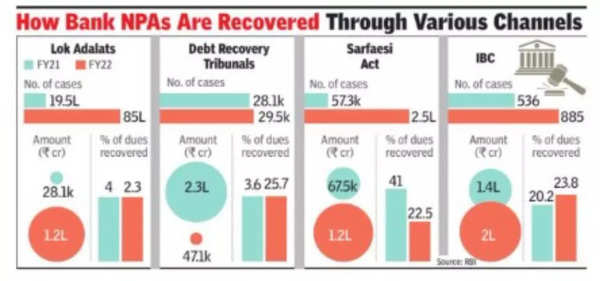Expand small business insolvency model to big corporations too: RBI – Times of India
Despite criticism that the insolvency framework is yielding lesser returns, the RBI has stood firm in support of the IBC as a process for addressing defaults in the corporate sector. The RBI has said that since significant value destruction has already occurred in these assets, the ‘haircut’ — or the comparison of realised value with admitted claims — is not a reasonable indicator of the resolution process. The central bank has instead drawn attention to the liquidation value, stating that the IBC has helped lenders recover close to 201% of the liquidation value until September 2022.
The RBI has, however, acknowledged that debt recovery tribunals (DRTs) and the Securitisation & Reconstruction of Financial Assets and Enforcement of Security Interest Act (Sarfaesi), 2002 continue to remain as effective as the IBC.

The pre-packaged process refers to an insolvency resolution mechanism where there is an understanding between the debtors and creditors on how to move forward. Once two-thirds of the creditors accept a resolution plan, the parties approach the insolvency court for its implementation. The government introduced the pre-pack insolvency resolution for micro, small and medium enterprises (MSMEs) and other small businesses. Incidentally, while the RBI has recommended the pre-package measure, only two cases have been admitted through this route since April 2021 and it is yet to gain traction.
One of the main challenges in the insolvency process is that there are very few cases that could be resolved within the legally mandated timelines. There is also no formal group resolution framework in place, although there have been several group-level insolvencies, including IL&FS Group, Videocon Group and Reliance Capital.
For all the latest business News Click Here

